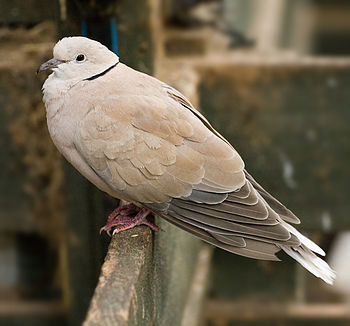 |
| A Feral Barbary Dove in Tasmania, Australia. Also known as a Ringneck Dove or Ring Dove (Streptopelia risoria) (Photo credit: Wikipedia) |
- White Dove
- Blonde
- Cream
- Pied
- Platinum
- Ivory
- Silver Ivory
- Wild (The color found in the wild)
Contrary to popular belief, doves enjoy being handled and are very easily trained. Ringneck Doves have been trained to perform a number of tasks and tricks for the delight of their owners.
Many new dove owners are pleasantly surprised to see the reaction of their bird when they return home from work or other errands. Many compare it to that of a dog. Their Ringneck Dove will begin flapping its wings, cooing and showing its genuine joy that you're home again. When you open the cage door it is almost certain your dove will fly directly to your shoulder. It is a truly rewarding feeling to see this expression of love from your pet.
The lifespan of Ringneck Doves - Doves can live to be 20 to 25 years old, with some reported to live much longer. The key to a long and happy life for your pet Dove is proper care and nutrition.
The Proper Cage - Doves can thrive and even breed in a cage as small as 2ft. x 2ft. If you do house your dove in a small cage like this you should provide it with plenty of time out of the cage. They need the opportunity to fly and stretch their wings. The best rule of thumb is to provide the largest cage you can afford and have space for.
A cage that is longer than it is tall is always best. This allows you to place a perch at each end so your dove can hop or fly from perch to perch. This allows them to get some exercise even when not out of the cage.
Proper Nutrition - There are several commercial brands of dove food on the market. These are readily available online or at your local pet store. Doves also do very well on a good quality wild bird seed mix. A mix that is formulated for a wide range of birds is best when using the wild bird seed. The choice of using a commercial brand of dove feed or a wild mix is a matter of personal preference. The difference in the two is that the commercial seed is better cleaned and processed to eliminate undesired contaminants.
Doves in captivity should not live on a seed only diet. Provide yours with chopped dark green vegetables, as well as chopped hard boiled eggs, shell and all. The egg shell is an excellent source of calcium.
Also be sure to provide a constant supply of properly sized grit. Adding crushed oyster shell will also provide additional calcium.
Don't Overlook A Dove When Considering Your Next Pet Bird.
Doves have a way of quickly stealing our hearts!
|

No comments:
Post a Comment